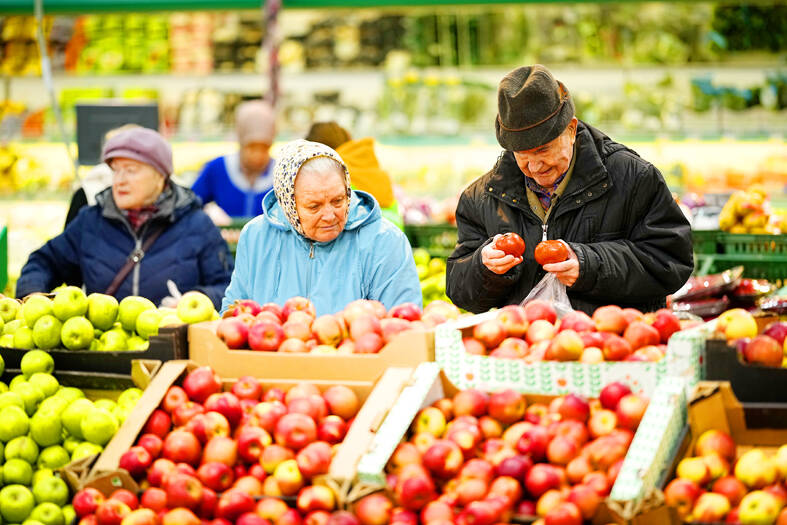Russian exports to Europe dropped by more than two-thirds last year, as the EU drastically cut its purchases of Russian oil and gas, Russia’s customs agency said yesterday.
EU countries have halted the vast majority of their energy purchases from Russia in a bid to heap economic pressure on Moscow over its military offensive against Ukraine.
Russian exports to Europe dropped 68 percent last year to US$84.9 billion, the Interfax news agency cited Russia’s federal customs agency as saying.

Photo: AP
Exports to Asia — which has replaced Europe as the country’s main energy client — were up 5.6 percent to US$306.6 billion, the agency said.
After it was hit with Western sanctions, Moscow stopped publishing a vast array of economic statistics, including trade data with individual countries.
Separate Chinese customs data showed two-way trade between the two countries hit a record US$240 billion last year, amid growing economic, trading and political ties between Beijing and Moscow.
Russia’s Central Bank also said last week that holdings of Chinese yuan in Russian bank accounts exceeded US dollars for the first time ever, as Russia’s financial system embraces the Chinese currency in the face of sanctions on its access to the US dollar.
Russia’s overall trade surplus came in at US$140 billion last year — down 58.5 percent from the previous year, which saw Moscow earn bumper energy revenues as its offensive on Ukraine sent oil and gas prices surging and Europe carried on buying Russian energy for much of the year.
Energy exports are a critical source of revenue for Russia’s budget, bringing in billions of dollars every month.
Russian imports from Europe were also down last year, falling 12.3 percent to US$78.5 billion, while the value of goods bought from Asia continued to climb, jumping 29.2 percent to US$187.5 billion, Interfax reported.
The Russian ruble steadied near 91 to the US dollar yesterday, held up by relatively high oil prices, as exporters start converting foreign currency revenues in preparation for month-end tax payments.
At 8:05am GMT, the ruble was 0.19 percent weaker against the US dollar at 91.07 and had lost 0.3 percent to trade at 98.31 versus the euro. It firmed 0.27 percent against the yuan to 12.53.

Taiwan Semiconductor Manufacturing Co (TSMC, 台積電) last week recorded an increase in the number of shareholders to the highest in almost eight months, despite its share price falling 3.38 percent from the previous week, Taiwan Stock Exchange data released on Saturday showed. As of Friday, TSMC had 1.88 million shareholders, the most since the week of April 25 and an increase of 31,870 from the previous week, the data showed. The number of shareholders jumped despite a drop of NT$50 (US$1.59), or 3.38 percent, in TSMC’s share price from a week earlier to NT$1,430, as investors took profits from their earlier gains

In a high-security Shenzhen laboratory, Chinese scientists have built what Washington has spent years trying to prevent: a prototype of a machine capable of producing the cutting-edge semiconductor chips that power artificial intelligence (AI), smartphones and weapons central to Western military dominance, Reuters has learned. Completed early this year and undergoing testing, the prototype fills nearly an entire factory floor. It was built by a team of former engineers from Dutch semiconductor giant ASML who reverse-engineered the company’s extreme ultraviolet lithography (EUV) machines, according to two people with knowledge of the project. EUV machines sit at the heart of a technological Cold

Taiwan’s long-term economic competitiveness will hinge not only on national champions like Taiwan Semiconductor Manufacturing Co. (TSMC, 台積電) but also on the widespread adoption of artificial intelligence (AI) and other emerging technologies, a US-based scholar has said. At a lecture in Taipei on Tuesday, Jeffrey Ding, assistant professor of political science at the George Washington University and author of "Technology and the Rise of Great Powers," argued that historical experience shows that general-purpose technologies (GPTs) — such as electricity, computers and now AI — shape long-term economic advantages through their diffusion across the broader economy. "What really matters is not who pioneers

TAIWAN VALUE CHAIN: Foxtron is to fully own Luxgen following the transaction and it plans to launch a new electric model, the Foxtron Bria, in Taiwan next year Yulon Motor Co (裕隆汽車) yesterday said that its board of directors approved the disposal of its electric vehicle (EV) unit, Luxgen Motor Co (納智捷汽車), to Foxtron Vehicle Technologies Co (鴻華先進) for NT$787.6 million (US$24.98 million). Foxtron, a half-half joint venture between Yulon affiliate Hua-Chuang Automobile Information Technical Center Co (華創車電) and Hon Hai Precision Industry Co (鴻海精密), expects to wrap up the deal in the first quarter of next year. Foxtron would fully own Luxgen following the transaction, including five car distributing companies, outlets and all employees. The deal is subject to the approval of the Fair Trade Commission, Foxtron said. “Foxtron will be